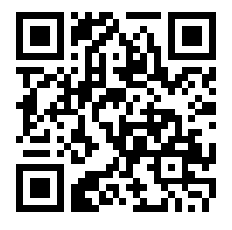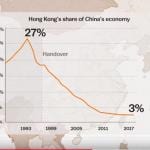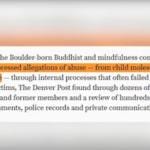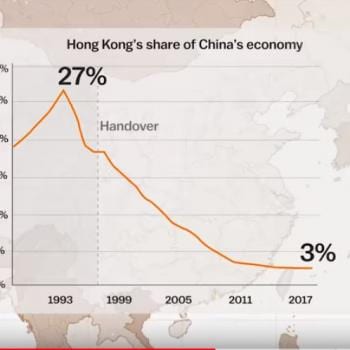As I’ve watched the Hong Kong protests from my home on peaceful Lamma Island over the past four months, I’ve looked for the religious undertones and motivations driving and uniting the region’s protesters. Early on, “Sing Hallelujah to the Lord” became an unofficial anthem of protesters, in part because adding a religious reason for a gathering (or protest) technically exempts it from certain police regulations.
But Christian leaders in Hong Kong have also been active supporters of the protests, in statements and in their participation and even leading some demonstrations. They have been thoroughly active, reflecting their own beliefs and concerns for those affected by changes in legislation.
This week the BBC followed one such Christian leader and his group as they sought to mediate between any groups that might become violent. “As Christians, when we see an unjust situation, we have to go out and guard the children,” one of the mediators says as the video begins. The head of the group, Roy Chan, adds, “As a Christian, this is what I can do for society, for God.” Whether they are effective in any conventional sense is unclear, as violence continues. However, they believe that by simply being present with love, they bring hope to the people.
This attitude, and ensuing action, is quite reminiscent of the Bodhisattva vow that many Mahayana Buddhists take. From the Upaya Institute and Zen Center, the vow (or vows) read as follows:
Creations are numberless, I vow to free them.
Delusions are inexhaustible, I vow to transform them.
Reality is boundless, I vow to perceive it.
The awakened way is unsurpassable, I vow to embody it.
The vow demands accountability and, in appropriate and thoughtful ways, action. I have been looking for responses from other religious leaders in and around Hong Kong and have so far seen very little.
https://www.youtube.com/watch?v=w1pusl_snxQ
For some further background on the current protests, the demands of protesters have been as follows:
- The withdrawal of the extradition bill
- Cease referring to the protests as riots
- Investigating police abuses
- Release of all protesters
- Universal suffrage for the Office of Chief Executive.
Last month the 1st one was ceded by Carrie Lam, the region’s Chief Executive. She then, however, passed what has been by all accounts a disastrous and completely ineffective anti-mask law (last weekend), which sparked many of the largest and widespread protests (with masks) to date. Recently, they’ve added a sixth demand, that the HK Police be disbanded. You’ll hear a bit about why in the podcast below.
In part the worry is that the police force has become a political tool, leading peaceful police to retire early or leave, and necessitating speedy recruitment of new officers, the majority of whom are joining expressly to enact violence upon protesters. It has been only a minority of officers, of course, but violence from police has been escalating with no accountability. The day before a recent shooting, in fact, police relaxed their guidelines regarding use of force.
It is as if a once very good police force has been pulled apart from the people they are meant to serve (Hongkongers) and pushed by poor leadership to a position where such violence is happening. As of yesterday, the Guardian has posted worry that Hong Kong is becoming a de facto police state.
A friend turned me on to this podcast, called “China Unscripted” which aired a great conversation you can listen to (it’s a podcast so you can also find it on any podcasting platform you use).
please join our community of patrons for $1/month
And read more about my life in Hong Kong and related topics

Do you do Bitcoin? Bit-tips welcome too: 35LhLFoAFeKqykkktmCzrAKj8GLdi3ebf2













